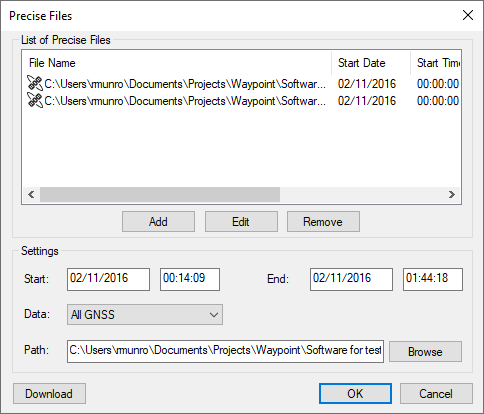Add Precise/Alternate Files
The Precise Files dialog primarily facilitates the easy download of precise products. Users can choose between GPS, GPS+GLONASS, and All GNSS (sources that provide data for GPS, GLONASS, BeiDou, Galileo and QZSS) sources depending on the signals acquired in data collection.
The Precise Files utility also enables a user to add alternate broadcast ephemeris data downloaded through the Download Service Data utility. A user may do this to supplement missing broadcast ephemeris data within their project.
Broadcast Ephemeris
The ephemeris file contains Keplerian orbital parameters used to compute satellite positions. Presently, the line of sight component of satellite positions can be computed within an accuracy of approximately 2 m (RMS) using the broadcast ephemeris.
Orbital error is largely removed in differential processing, as the line of sight component is correlated at short and medium baseline lengths (< ~100 km). Therefore, the accuracy of the broadcast orbits is completely sufficient for most projects. A discussion on precise orbits is found in the next section.
Generally, the GNSS receiver includes broadcast ephemeris data with its raw data files. The decoder converts these files into EPP format. Receivers typically output ephemerides at startup, as satellites rise into view, or approximately every two hours.
Prior to processing, all ephemeris information collected at the base station(s) and remote are combined. This minimizes the chance of missing broadcast ephemerides.
In version 8.50 and earlier, if a GPS broadcast ephemeris was missing the satellite could not be used regardless of whether or not a precise ephemeris file had been added to the project. Versions 8.60 and greater are not dependent on the presence of GPS, BeiDou, Galileo and QZSS broadcast ephemerides and any missing broadcast values can be fixed by adding a precise ephemeris to the project. The same is not true for GLONASS, broadcast ephemerides are required regardless of whether a precise ephemeris has been added to the project. The Download Service Data utility can be used to download a global broadcast ephemeris file in EPP format as well as to download precise ephemerides.
Precise Ephemerides
Precise ephemerides are computed from data collected by ground reference stations around the world. These files are produced by various agencies, including CODE (Center for Orbit Determination in Europe), the IGS, TerraStar and others. The different precise ephemeris products vary in the rate they provide precise clock corrections, the constellations for which data is provided, and their latency. Presently supported products range in latency from approximately 15 minutes to 3 weeks. The difference in accuracy between rapid and final products is marginal, well within the noise of either differential or PPP kinematic solutions.
Presently, precise ephemerides reduce the line of sight component of satellite position error to approximately 2 cm RMS (as compared with approximately 2 m RMS for broadcast orbits). As orbital error is largely canceled in differential processing, adding precise ephemerides to a differential project will only produce observable differences where the baseline length is large (150-200 km). For this reason, adding precise orbits to a differential project is generally considered optional.
Precise ephemerides can be downloaded through the Download Service Data utility or directly through the GrafNav/Inertial Explorer interface. Adding a precise ephemeris file will compensate for any missing broadcast ephemeris data for GPS, BeiDou, Galileo and QZSS satellites. A broadcast ephemeris for each GLONASS satellite observed is required regardless of the presence of a precise ephemeris.
How to download precise ephemeris files

-
Select File | Add Precise/Alternate Files.
The project start and end date are automatically scanned from the GNSS data loaded into the project. This should not need to be set manually.
-
Select Browse in order to choose any precise orbits (.sp3), clock files (.clk) or NRT files (.cor) that have previously been downloaded.
If no files have been downloaded, select Download after specifying the source to download from under Constellation. Note that multiple precise products for the same day cannot be loaded into one project. The precise orbit (.sp3) and clock (.clk) data will automatically be downloaded and added to your project. This requires an internet connection.
If you have a license for the NRT feature, NRT correction data (.cor) can be chosen to download into the project. See Waypoint TerraStar Near Real-Time (NRT) Precise Satellite Clocks and Orbits.
If your project includes GLONASS or other constellation data, make the appropriate selection under the "Constellation" pull down menu prior to downloading. The default search location for precise products contains only GPS data.
Waypoint TerraStar Near Real-Time (NRT) Precise Satellite Clocks and Orbits
The Waypoint TerraStar NRT feature provides quick access to precise satellite clock, orbit, code bias and phase bias data, which facilitates Precise Point Positioning (PPP) and PPP ambiguity resolution (PPP-AR) in applications that demand a quick turnaround. NRT clocks, orbits, code biases and phase biases are provided by TerraStar, NovAtel’s partner in high precision positioning products and services. TerraStar owns, operates, maintains and controls its global network of GNSS reference stations and the associated infrastructure to ensure maximum operational reliability of its augmentation services for precise positioning. With a long history in satellite-based correction services, TerraStar provides seamless delivery of trusted corrections for demanding applications.
The purchase of an NRT license is required for access to this feature and the PPP-AR feature. NRT correction files are available approximately 15 minutes after data collection, with accuracy similar to that of final precise ephemeris data (see Precise Ephemerides for more information on precise ephemerides).
Satellite Clock Files
Presently, using the data available in the broadcast ephemeris, satellite clock errors can be predicted within an accuracy of approximately 2 m RMS. Satellite clock error is completely removed in differential processing, as this error is exactly the same at the base and the rover. Thus adding precise clock files to a differential project will have no effect.
Satellite clock files can be downloaded through the Download Service Utility or from File | Add Precise/Alternate Files.